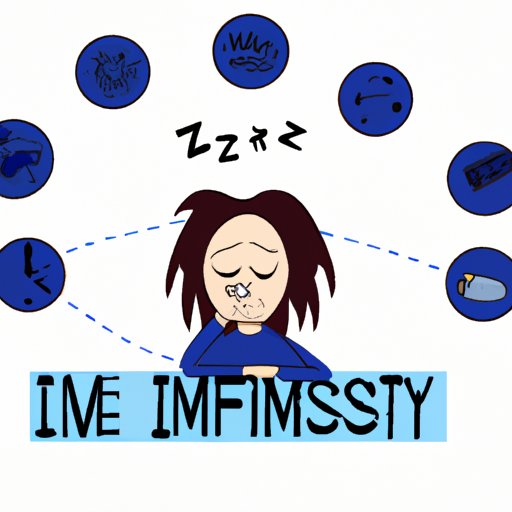Introduction
Sleep is essential for physical and mental health, yet many people struggle to get enough restful sleep each night. Sleep deprivation can have serious consequences on both physical and mental health, including an increased risk of developing chronic diseases. This article will explore how not getting enough sleep can make a person more susceptible to illness and discuss the potential implications of this link.

Examining the Health Consequences of Sleep Deprivation
Sleep deprivation can have a significant impact on physical and mental health. People who do not get enough sleep may experience fatigue, mood swings, difficulty concentrating, and impaired judgment. In addition, lack of sleep has been linked to an increased risk of developing certain chronic conditions, such as obesity, diabetes, hypertension, and heart disease.
The lack of sleep can also affect mental health. Studies have shown that people who suffer from insomnia or other sleep disorders are at a higher risk of depression, anxiety, and bipolar disorder. Furthermore, sleep deprivation has been linked to an increased risk of developing dementia and Alzheimer’s disease.

Exploring the Link Between Lack of Sleep and Illness
Recent studies have found a strong correlation between lack of sleep and increased risk of illness. One study, published in the journal Nature Communications, found that individuals who slept fewer than six hours a night were four times more likely to catch a cold than those who got seven to nine hours of sleep. Other studies have also found a link between lack of sleep and increased risk of developing certain chronic conditions.
These findings suggest that sleep deficiency can make a person more vulnerable to infection and illness. But how does insufficient sleep affect the body’s ability to fight off infection?
Investigating How Sleep Deficiency Can Compromise Immunity
Sleep plays an important role in maintaining a healthy immune system. During sleep, the body releases hormones, such as melatonin, which help regulate the immune system. These hormones help the body recognize and fight off invading pathogens and viruses.
When a person does not get enough sleep, their body does not produce enough of these hormones. This can lead to a weakened immune system, making the person more susceptible to infection and illness. In addition, lack of sleep can disrupt the production of white blood cells, which are essential for fighting off infection.
Understanding the Impact of Fatigue on Physical and Mental Well-Being
Fatigue can have both physical and cognitive effects on the body. Physiologically, fatigue can cause headaches, muscle aches, and difficulty concentrating. Cognitively, it can impair judgment, reduce reaction time, and make it difficult to think clearly.
In addition, fatigue can lead to feelings of irritability, depression, and anxiety. These feelings can further exacerbate any existing physical and mental health issues, making it even more difficult to manage them.

Determining if Insufficient Sleep Increases Risk of Disease
Although there is a strong correlation between lack of sleep and increased risk of illness, further research is needed to determine if sleep deficiency can actually cause disease. Some studies have suggested that inadequate sleep can increase the risk of developing certain chronic conditions, such as obesity, diabetes, and heart disease.
However, the evidence is still inconclusive. More research is needed to understand the exact mechanisms by which sleep deficiency can lead to disease. If further research confirms the link between lack of sleep and increased risk of illness, it could have serious implications for public health.
Conclusion
Sleep is essential for physical and mental health, yet many people struggle to get enough restful sleep each night. This article has explored how not getting enough sleep can make a person more susceptible to illness. It has examined the correlation between lack of sleep and increased risk of illness, the effects of fatigue on the immune system, and research findings linking lack of sleep to various illnesses.
Although further research is needed to confirm the link between lack of sleep and increased risk of illness, it is clear that getting enough sleep is crucial for maintaining good health. To improve sleep habits, it is recommended to establish a regular bedtime routine, avoid caffeine and alcohol before bed, and limit exposure to blue light from electronic devices.
It is also recommended to talk to a doctor if sleep problems persist. Understanding the potential consequences of sleep deprivation can help people make informed decisions about their sleep habits and take steps to ensure they are getting enough restful sleep each night.


